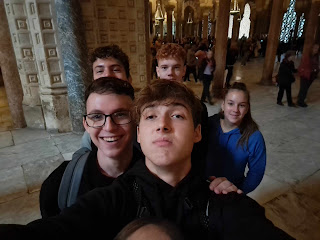Nőnek, tanárnak lenni Izlandon / Being a woman, a teacher in Iceland (Halász Judit)
Még soha egyetlen tanfolyam keretében sem kaptam olyan teljes képet egy országról, mint most, és mindezt úgy, hogy az országot kevéssé ismerők is könnyen feldolgozhatták a hallottakat.
Az utolsó nap Izland kormányzati-politikai rendszere volt a súlyponti téma. Megtudtuk, hogy a demokrácia index alapján Izland Norvégia mögött az irigylésre méltó másodig helyen áll a világ országainak listáján. Hogy miért olyan elöl helyezkedik el, azt bárki megértheti, aki egy látogatást tesz az izlandi törvényhozás épületében. Az itteni látogatás során egy remek idegenvezetés keretében további bepillantást nyerhettünk abba, hogyan is működik Izlandon a demokrácia, illetve hogyan sikerül megvalósítaniuk a nemek közötti egyenlőséget.
Never before have I been able to get such a complete picture of a country in any course, and in a way that people who know little about the country can easily understand. The last day focused on Iceland's political and governmental system. We learned that Iceland ranks an enviable second in the world behind Norway on the Democracy Index. Why it is ranked so high can be understood by anyone who pays a visit to the Icelandic legislature. During our visit there, we were given a great guided tour to give us a further insight into how democracy works in Iceland and how they manage to achieve gender equality.
Női egyenjogúságról pár érdekesség:
- Az eredeti foglalkozására nézve tanár, Vigdís Finnbogadóttir volt a világ első demokratikus úton megválasztott államfője. Gyermekét egyedül nevelő anyaként nyerte el ezt a pozíciót, amit 15 éven át töltött be.
- Amikor először bekerült a parlamentbe ő volt az egyetlen női képviselő, ma a képviselők 50 %-át teszik ki a hölgyek.
- Finnbogadóttir rengeteget tett azért, hogy a férfiak dominálta világban a nők nagyobb szerepet kapjanak. Elérte, hogy nemre való tekintet nélkül tiszteljék, szeressék az egész országban. Egy hozzá kacsolódó kis történet, megmutatja, hogyan változott meg a nők értékelése rövid két évtized alatt. Amikor Finnbogadóttir elnöksége után újra férfi töltötte be ezt a tisztséget, akkor a kisfiú megkérdezi apukáját: " apa, ezt a tisztséget férfiak is betölthetik?"
- A nők megbecsüléséért azonban valamennyi izlandi nő együtt küzdött: 1976-ban egy napra minden nő letette a munkát mind otthon mind a munkahelyén azért, hogy megmutassa a férfiaknak, hogy nélkülük nem működne a társadalom. Az összefogás meghozta az eredményét.
Some interesting facts about women's equality:
-Vigdís Finnbogadóttir was the world's first democratically elected head of state. She won the position as a single mother raising her child, a position she held for 15 years. Her original occupation was teacher.
- When she first entered parliament, she was the only woman MP, now 50% of MPs are women.
- Finnbogadóttir has done a lot to empower women in a male-dominated world, and she is highly respected and loved in the country.
- All Icelandic women fought for women's dignity: in 1976, all women gave up work at home and at work for one day to show men that society would not function without them.
Az alábbi képen a Finnbogadóttirról készült szobrot láthatjuk, ami a parlament bejárata mellett áll. Az ábrázoláson több szimbolikus elemre is felfigyelhetünk. Az elnöknő kabátját erősen fújja a szél, aminek az a jelentése, hogy mindig ellenszélben kellett tevékenykednie, de legyőzte az ellenállást. A talapzata a szobornak egy fordított piramis, ami a nyitottságot, befogadókészséget szimbolizálja.
The picture below shows the statue of Finnbogadóttir, which stands next to the entrance to the Parliament. Several symbolic elements can be observed in the design. The President's coat is being blown hard by the wind, which means that she has always had to operate into a headwind, but she has overcome the resistance. The base of the statue is an inverted pyramid, symbolising openness and inclusiveness.
Tanárnak lenni Izlandon:
Itt nem küzdenek tanárhiánnyal. A fiatalok szívesen választják ezt a pályát, mivel mind erkölcsileg, mind anyagilag megbecsülik a gyermekeiket tanítókat. Egy izlandi tanár 900 000 koronát keres havonta, ami még akkor is csillagászati összegnek tűnik Magyarországról nézve, ha tudjuk, hogy ilyen keresetnél már 45 % az adó. (Egy izlandi korona kb. 2,65 forint) Azon gondolkodom, vajon abban, hogy ilyen magas a tanári pálya presztízse, lehet-e némi szerepe annak, hogy ennyi nő, illetve anya van a parlamentben?
A tanárok megbecsültségét jelzi az is, hogy a kurzusunk mai parlamenti látogatása felkerült a parlament hivatalos facebook oldalára:
Iceland does not have a teacher shortage. Young people are keen to take up this career because it is valued both morally and financially. An Icelandic teacher earns 900 000 kroner a month (one Icelandic kroner is about 2.65 forints), which seems astronomical for a Hungarian teacher, even if you know that the tax rate is 45%. Could the fact that there are so many women and mothers in parliament have something to do with this?
The fact that our course's visit to the parliament today was posted on the parliament's official facebook page is a sign of the teachers' appreciation:
Magyarul:
The Erasmus plus teaching team came to visit this morning and were welcomed by Helga Einarsdóttir, Head of Education. The group was given a tour of the Parliament building and were introduced to the educational activities available at all school levels. We thank them very much for coming! ☀️




.jpg)


Megjegyzések
Megjegyzés küldése